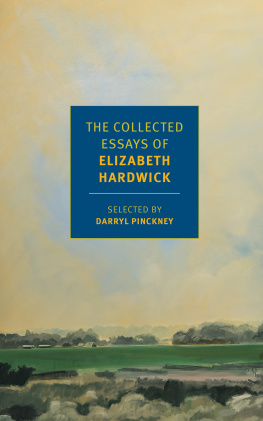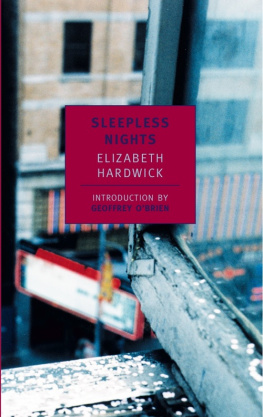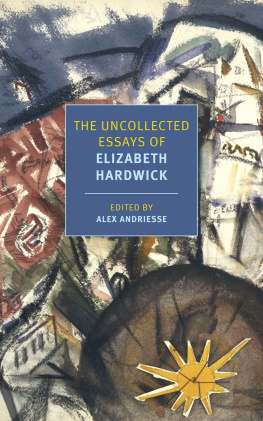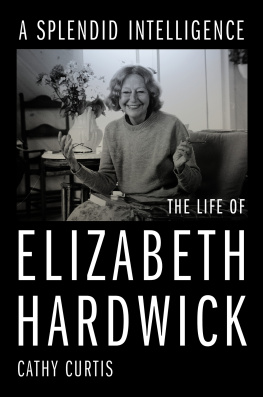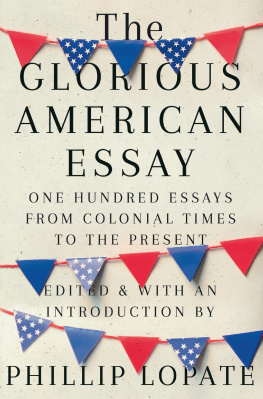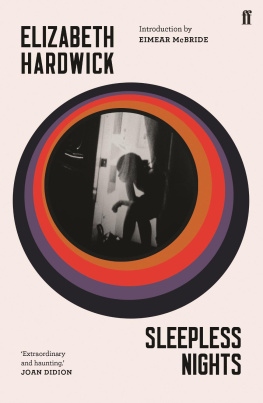ELIZABETH HARDWICK (19162007) was born in Lexington, Kentucky, and educated at the University of Kentucky and Columbia University. A recipient of a Gold Medal from the American Academy of Arts and Letters, she is the author of three novels, a biography of Herman Melville, and four collections of essays. She was a co-founder and advisory editor of The New York Review of Books and contributed more than one hundred reviews, articles, reflections, and letters to the magazine.
DARRYL PINCKNEY selected The New York Stories of Elizabeth Hardwick (2010). He is the author of two novels, High Cotton (1992) and Black Deutschland (2016), and of two works of nonfiction, Out There: Mavericks of Black Literature (1992) and Blackballed: The Black Vote and US Democracy (2014). He also worked for Robert Wilson on his productions of The Forest, Orlando, Time Rocker, The Old Woman, Letter to a Man, and Garrincha: A Street Opera.
OTHER BOOKS BY ELIZABETH HARDWICK PUBLISHED BY NYRB CLASSICS
The New York Stories of Elizabeth Hardwick
Selected and with an introduction by Darryl Pinckney
Seduction and Betrayal
Introduction by Joan Didion
Sleepless Nights
Introduction by Geoffrey OBrien
THE COLLECTED ESSAYS OF ELIZABETH HARDWICK
Selected and with an introduction by
DARRYL PINCKNEY
NEW YORK REVIEW BOOKS

New York
THIS IS A NEW YORK REVIEW BOOK
PUBLISHED BY THE NEW YORK REVIEW OF BOOKS
435 Hudson Street, New York, NY 10014
www.nyrb.com
Essays copyright 19532003 by Elizabeth Hardwick
Selection copyright 2017 by NYREV, Inc.
Introduction copyright 2017 by Darryl Pinckney
All rights reserved.
Cover painting: Cornelia Foss, Lopers Path, 2000; courtesy of the artist; photograph by Christopher Foss
Cover design: Katy Homans
Library of Congress Cataloging-in-Publication Data
Names: Hardwick, Elizabeth, author. | Pinckney, Darryl, 1953 editor.
Title: The collected essays of Elizabeth Hardwick / by Elizabeth Hardwick ; edited and with an introduction by Darryl Pinckney.
Description: New York : New York Review Books, [2017] | Series: New York Review Books classics
Identifiers: LCCN 2017014041 (print) | LCCN 2017014050 (ebook) | ISBN 9781681371559 (epub) | ISBN 9781681371542 (paperback)
Subjects: | BISAC: LITERARY COLLECTIONS / Essays. | LITERARY COLLECTIONS / American / General.
Classification: LCC PS3515.A5672 (ebook) | LCC PS3515.A5672 A6 2017 (print) | DDC 814/.52dc23
LC record available at https://lccn.loc.gov/2017014041
ISBN 978-1-68137-155-9
v1.0
For a complete list of titles, visit www.nyrb.com or write to:
Catalog Requests, NYRB, 435 Hudson Street, New York, NY 10014
CONTENTS
INTRODUCTION
C OME AGAIN , Professor Hardwick said, doing that seesaw dance with her shoulders, as if to say, get a load of him. Id no idea what she was talking about. She nodded toward the blue-and-magenta paperback on top of my notebook: it was by a distinguished, elderly member of the Columbia faculty. If I was reading that for a class, then I should drop that class right away. Who, she wondered, apart from the professor himself, would make students read him on the Romantics. Not much of interest there, she finished.
The exchange happened faster than it has taken me to recall it, from her getting settled in her seat, to me, the apple-polisher, claiming first chair and opening another notebook. Shed laughed at the class for our thinking we would want to take notes. Most of us persisted. She taught by quotation and aside, citation and remark, stone down the well and echo. Most of her lessons were for later. She would peer over the book and exhale, trusting to Fortuna that somebody sitting around the table might get it eventually.
Perhaps Professor Hardwick wanted to drift off, through the window and away, but she couldnt. Literature meant too much to her and was the only kind of writing she wanted to teach, not that it could be taught. She hoped wed learn to ask questions of ourselves as we wrote. How can you sustain this tone? Then enough was enough, on to the next person and her or his fifteen minutes of lip-parting attention. Im afraid I dont find that terribly interesting as an approach, shed say. Your weekly offering was not much commented upon; she much preferred to be interested in what she was reading. Boredom was not listlessness, it was a nervous strain, while to be occupied with something like a great book could be wonderfully, sometimes painfully, liberating. Pedagogya word she would make fun of, starting from the dash. In the essays of Elizabeth Hardwick that dash is often a warningbeware of sting.
We, her fascinated and silent creative writing class at Barnard College in 1973, knew who she was. Needful facts, as she would say: Elizabeth Hardwick, born in Lexington, Kentucky, in 1916, left graduate school at Columbia University because she wanted to write. I dont remember if she told the class that or not. Her first novel, The Ghostly Lover, was published in 1945. The first thing I ever read by her was the opening chapter of Sleepless Nights, the novel she was writing then under the title The Cost of Living. That stunning first chapter was published in The New York Review of Books while I was in her class. She told me laterit has been one of the honors of my life to have studied with her and to have benefited from her generous conversations about literature down through many yearsthat Stuart Hampshire wrote her at the time to say that the chapter was so amazing he couldnt imagine how shed be able to go on from there. As a beginning, it was an impossible act to follow. She said she found out that he was right and she ended up breaking up the chapter and redistributing it throughout the novel.
I was about to say that because Id read her fiction first I always thought of her as more than a critic. But I can hear how blistering shed be about that phrasemore than a critic. For her, literary criticism had to be up there with its subjects; real literature should elicit criticism worthy of the achievement in question. We got that from her straight off. The kind of modern literary criticism she was talking aboutVirginia Woolf, D. H. Lawrence, Edmund Wilson, William Empson, Randall Jarrell, R. P. Blackmur, John Berryman, F. W. Dupee, Mary McCarthywas as stimulating as the work it was exploring. Then, too, she wanted us to take seriously the essay as a form. The American essayThoreau, Emerson, Twain, Henry Adamswas an important part of American history. Professor Hardwick had a fearsome reputation on campus. She wasnt regular faculty; she was that lowly thing, the adjunct, a very New York position in a city full of writers who supplemented their income or saved themselves by the odd teaching job. She did not undertake her duties lightly. She stood for something. The New York Review of Books, for starters, and that was intimidating enough, once I learned what it was. From the very beginning, I understood that Elizabeth Hardwick was what used to be called a writers writer.
We would all be better off in law school, because writing wasnt a profession exactly, and certainly not much of a life. She discovered that I thought Grub Street was a novel by Dickens. She made fun of your choices, what you were wasting your time on, but she never made you feel odd for not having heard of something. It was just what you didnt know yet. Samuel Johnson and Alexander Pope were experiences to look forward to, as she once had, up from the University of Kentucky, refusing to be buried alive in graduate school at Columbia University. Moreover, the more you read, the more discriminating you became about what you read. She lived to read. Her passions were instructive.

